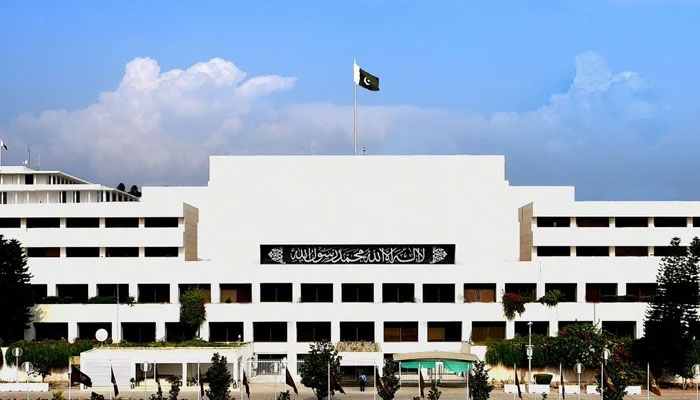NA secretariat notifies law curtailing CJP’s powers
National Assembly Secretariat notified the “Supreme Court Practice and Procedure Bill 2023” as an act of parliament curtailing CJP's suo motu powers
ISLAMABAD: The National Assembly Secretariat Friday notified the “Supreme Court Practice and Procedure Bill 2023” as an act of parliament curtailing the suo motu powers of chief justice of Pakistan.
The bill — passed by a joint sitting of parliament on April 10 — was returned unsigned by President Alvi on Thursday.
An eight-member bench of the Supreme Court, however, halted the bill’s implementation.
The notification says the bill is deemed to have been given assent by the president under Article 75(2) of the Constitution and has been published in the Gazette of Pakistan.
Earlier, the bill approved by the federal cabinet on March 28 and then passed by both the houses of the parliament was sent to the president but it came back unsigned.
The president observed that the bill travelled beyond the competence of parliament. The bill proposes that every case, appeal or matter before the Supreme Court, shall be heard and disposed of by a bench constituted by a committee comprising the chief justice of Pakistan and two senior-most judges in order of seniority.
It further states any matter invoking the exercise of original jurisdiction under Clause (3) of Article 184 of the Constitution shall be first placed before the committee for examination and if the committee is of the view that a question of public importance with reference to enforcement of any of the fundamental rights is involved, then it shall constitute a bench comprising not less than three judges of the apex court, which may also include the members of the committee for adjudication of the matter.
The Bill recommends that an appeal shall lie within 30 days from the final order of a bench of the Supreme Court that exercised jurisdiction to the larger bench of the apex court and such appeal shall for hearing be fixed within a period not exceeding fourteen days.
Furthermore, it grants a party the right to appoint a counsel of its choice for filing a review application.
The right of appeal shall also be available to any aggrieved party against whom an order had been passed under Article 184(3) before commencement of the Supreme Court Practice and Procedure Act, 2023.
-
 Inside Cardi B's Real Feelings Related To Stefon Diggs Split Post One Year Of Romance
Inside Cardi B's Real Feelings Related To Stefon Diggs Split Post One Year Of Romance -
 Former Sri Lankan Intelligence Chief Arrested Over 2019 Easter Bombings
Former Sri Lankan Intelligence Chief Arrested Over 2019 Easter Bombings -
 Kristen Bell Shares One Rule For 'SAG' Awards Ceremony That She Will Ditch This Time: 'Happy And Fun'
Kristen Bell Shares One Rule For 'SAG' Awards Ceremony That She Will Ditch This Time: 'Happy And Fun' -
 Woman Suing Meta Platforms, YouTube Over Social Media Addiction Sticks To Claims After Trial
Woman Suing Meta Platforms, YouTube Over Social Media Addiction Sticks To Claims After Trial -
 Shakira Applauded For 'gracious' Behaviour By Fans As She Blends Work With Family Downtime
Shakira Applauded For 'gracious' Behaviour By Fans As She Blends Work With Family Downtime -
 Prince William Hits The Roof With The Andrew Saga Bleeding Into Earthshot
Prince William Hits The Roof With The Andrew Saga Bleeding Into Earthshot -
 Mexico’s President Considers Legal Action Over Elon Musk Cartel Remark
Mexico’s President Considers Legal Action Over Elon Musk Cartel Remark -
 HBO Gives Major Update About 'Industry' Season Five And Show's End
HBO Gives Major Update About 'Industry' Season Five And Show's End -
 Donnie Wahlberg Responds To 'Boston Blue' Backlash: 'Nobody Was More Disappointed Than Me'
Donnie Wahlberg Responds To 'Boston Blue' Backlash: 'Nobody Was More Disappointed Than Me' -
 Jennifer Garner Gets Emotional Over Humble Career Start: 'It Makes Me Want To Cry'
Jennifer Garner Gets Emotional Over Humble Career Start: 'It Makes Me Want To Cry' -
 Princess Beatrice Told An Acquaintance That She ‘likes’ Jeffrey Epstein: Grim Verdict Drops
Princess Beatrice Told An Acquaintance That She ‘likes’ Jeffrey Epstein: Grim Verdict Drops -
 Late Katherine Short's Neighbours Give Insights Into Her 'peace Loving' Personality Post Suicide
Late Katherine Short's Neighbours Give Insights Into Her 'peace Loving' Personality Post Suicide -
 Fresh Details Of King Charles, Queen Camilla's US Visit Emerge Amid Andrew Investigation
Fresh Details Of King Charles, Queen Camilla's US Visit Emerge Amid Andrew Investigation -
 Iran 'set To Buy' Chinese Carrier-killer Missiles As US Forces Gather In Region
Iran 'set To Buy' Chinese Carrier-killer Missiles As US Forces Gather In Region -
 Prince Harry And Meghan Unlikely To Meet Royals In Jordan
Prince Harry And Meghan Unlikely To Meet Royals In Jordan -
 Hero Fiennes Tiffin Shares Life-changing Advice He Received From Henry Cavill
Hero Fiennes Tiffin Shares Life-changing Advice He Received From Henry Cavill




